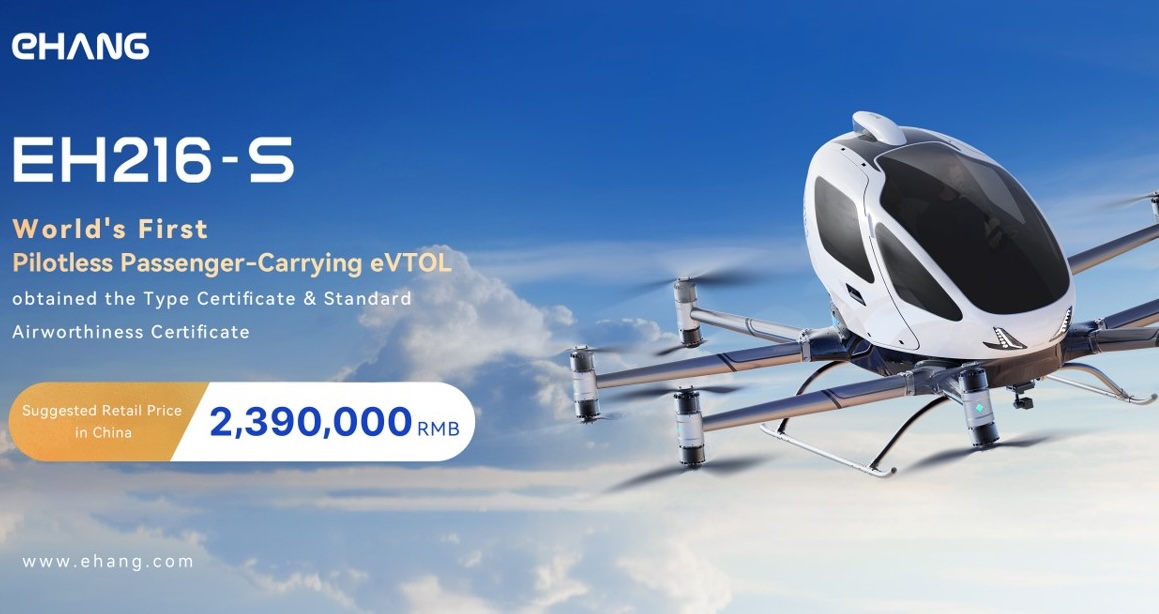
China’s top air taxi developer, EHang, not only beat its international rivals to become the world’s first startup to secure certification of its electric vertical takeoff and landing vehicle (eVTOL), but it went a step further this month in becoming one of the very few manufacturers in the sector to reveal the list price of its craft – and an exceptionally low one, at that.
First, the money detail: EHang announced it will be selling its EH216-S two passenger autonomous air taxi for RMB2.39 million, or the equivalent of $334,000. The company said sales of the craft at that price will begin “effective from April 1, 2024,” with the cost designed to “more effectively cater to the market needs and further enhance the value of” its eVTOL plane. Which sounds like a volume play over per-plane revenue objectives, but it’s hard to know exactly what the rather ambiguous phase is intended to mean.
Its disclosure of the air taxi’s unit price comes after the EH216-S in December became the world’s first eVTOL to receive a Standard Airworthiness Certificate for passenger operation. That followed EHang’s air taxi having been granted “Type Certification in October – both authorizations coming from its home nation regulator, the Civil Aviation Administration of China (CAAC).
Whether taken individually or together, those developments are significant milestones in the race to launch air taxi services expected in 2025 around the world, and now presumably sooner in China. Yet because they’re indeed all limited to EHang’s domestic market, a little relativizing is also prudent.
For example, murmuring was heard among sector watchers in response to EHang’s certification news. Given the future economic stakes and national pride involved in an eVTOL developer being first to the market with an air taxi, some observers suggested criteria in the CAAC’s approval may not have been as stringent as those regulators elsewhere will apply. Based on those suspicions, skeptics say, it’s debatable whether the EH216-S will gain similar approval abroad any time soon.
For that reason, the pricing of the aircraft is similarly prone to qualifying reactions.
Certified in China and certain to have a head start in sales there – and enjoy considerable buyer preference as the sector’s national champion – EHang may have the luxury of being able to initially sell the EH216 eVTOL at strategically low levels. Why? Because in that situation, getting the maximum number of its air taxis into operation – or at least in to the hands future clients in pump-priming interests – may be more important at this stage than maxing out per unit profits.
Indeed, those rollout prices equivalent to $334,000 for an EHang air taxi appear to be in loss-leader territory compared to estimations about what other eVTOL makers are likely to charge.
German startup Lilium, for example, has said its luxury Pioneer Edition craft will fetch between $7 million and $10 million. Joby reportedly estimated production costs of its future air taxi at around $1.3 million per plane, while sector analysts tend to set the likely range for next generation aircraft at between m $1.2 million to over $4 million. EHang’s price therefore represents 25% to under 10% of those.
It’s very early in the game, and things will continue significantly shaping up. For now, there’s little debate that EHang has indeed rolled up several impressive developmental and administrative coups since earning its first certification in October – part of its continued surge toward launch of its eVTOLs into service in China and beyond.
It remains to be seen whether all those milestones translate into a real advantage on the world air taxi stage in the longer run – and whether an aircraft that may have cost billions to research, create, and produce can be viably sold for prices far below expected sector averages.
.
FTC: We use income earning auto affiliate links. More.



Comments